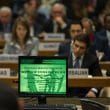Why don’t problems get fixed?
By Louise Bezuidenhout, Chandre Gould, April 25, 2014
In Round One, the authors participating in this roundtable identified several problems that must be addressed if developing countries are more effectively to detect and respond to emerging and re-emerging diseases—or prevent and detect malevolent or accidental releases of pathogens. The ideas presented in the three essays are important. But they are not new to discussions on disease control.
Oyewale Tomori correctly identified several weaknesses in nations’ health capacities, including inadequate systems of disease surveillance and poor laboratory support. He proposed that nations "take ‘ownership’ of systems for disease surveillance, prevention, and control," and also urged governments to share information and resources. Maria José Espona focused on the integrity of the data that surveillance systems provide and argued that health professionals, particularly in developing countries, often exhibit low capacity to produce accurate data. She believes that education represents a big part of the solution to emerging pathogens. We, the authors, believe likewise, and we argued in Round One that improved ethics education for scientists is crucial.
But for years, the problems identified in Round One have received attention in international health discussions, particularly in the context of the Biological and Toxin Weapons Convention (BTWC) and the World Health Organization (WHO). The concerns raised by Oyewale and Espona are addressed to a large extent in the 2005 International Health Regulations, a legally binding international agreement negotiated under the auspices of the WHO, which specifically requires states to "develop minimum core public health capacities." In support of this requirement, the WHO’s Department of Global Capacities Alert and Response works to enhance national and international capacities in disease surveillance and response. As for ethics education and awareness-raising for scientists, these issues have been identified in the context of the BTWC, over at least the last eight years, as critical in preventing malevolent uses of the life sciences.
Shortcomings in national capacity, disease surveillance, and ethics education are well understood. So what stops them from being addressed successfully? The likely answer is that these shortcomings are symptoms of larger problems in the global health system. One such problem is weak or corrupt governance, as addressed by Tomori in Round Two. Another is the relatively low priority given to public health at the regional, national, and international levels.
But in addition, while the BTWC has the potential to provide a framework for international cooperation and exchanges in health, its effectiveness is undermined by its current inertia—which can be traced to the 2001 collapse of negotiations to establish a verification mechanism for the treaty. The BTWC, like other disarmament treaties, is also vulnerable to larger international political tensions. Today, decision-making processes in the treaty context are all but nonexistent.
In 2011, ahead of the Seventh Review Conference for the treaty, co-author Gould, along with Jeremy Littlewood and Gigi Kwik Gronvall, argued that one way to cure the BTWC’s malaise might be to more vigorously implement the treaty’s Article X, which encourages states to share knowledge and technologies. Such sharing could, among other things, improve disease detection and response. Gould, Littlewood, and Gronvall recommended—and this remains as relevant today as it was in 2011—that knowledge and technology exchanges between developed and developing nations no longer be cast as interactions between donors and hapless recipients.
Indeed, when it comes to disease surveillance and response, developing countries can give as much as they gain in exchanges with wealthier nations. But as things stand now, developing countries don’t view the BTWC as a useful forum through which to raise concerns and share knowledge. This produces something of a chicken-or-egg problem, because if the treaty is to become truly relevant to scientists and publics in emerging countries—and more effective on a global level—developing nations need to put their own stamp on proceedings. Discussions at the BTWC that do not take into account the concerns of developing countries produce linguistic and conceptual gaps that ultimately induce apathy. This problem must be overcome if all parties to the treaty are to participate in it effectively.
Unfortunately, there are only a tiny handful of civil society groupings around the world that follow the proceedings of the BTWC. A similarly insignificant number of national activist organizations campaigns for improved public health services. So while the treaty could offer a powerful tool for fostering international discourse on disease control, something is lacking—the political pressure and sense of purpose needed to effect changes that could counter the spread of disease.
Topics: Biosecurity
Share: [addthis tool="addthis_inline_share_toolbox"]














